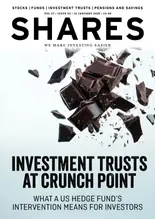
A warning by AB Foods about rising costs for Primark in the year ahead hurt retail stocks in London early Thursday, while the European Central Bank is set to announce another big interest rate hike.
The ECB is set to carry out just its second interest rate hike in over 10 years on Thursday, and there is a conviction that it could turn to an eye-popping 75 basis point lift, in a bid to corral record inflation.
The central bank announces its latest monetary policy decision at 1315 BST on Thursday. This will be followed by a press conference with ECB President Christine Lagarde at 1345 BST.
In July, the ECB raised interest rates for the first time in 11 years, by half a percentage point. Another rise of 50 basis points has been hinted at for the September meeting, but continued high inflation has prompted calls for more drastic action.
The FTSE 100 index was up 34.58 points, or 0.5%, at 7,272.41 early Thursday. The mid-cap FTSE 250 index was up 80.00 points, or 0.4%, at 18,887.16. The AIM All-Share index was up 2.92 points, or 0.3%, at 868.89.
The Cboe UK 100 index was up 0.2% at 726.04. The Cboe 250 was flat at 16,227.20 and the Cboe Small Companies up 0.2% at 12,744.05.
In the FTSE 100, Melrose was down 1.7%, having swung from a 5% opening gain, as it announced the demerger of two businesses.
The industrial acquisition specialist said it intended to separate its GKN Automotive and GKN Powder Metallurgy businesses to create two independent and separately listed companies.
In the six months that ended June 30, pretax loss widened to £358 million from the £275 million loss reported a year prior. Revenue in the first half increased by 4.7% to £3.59 billion from £3.43 billion.
Adjusted for its equity accounted investments, pretax profit rose 12% to £128 million from £114 million, and revenue was up 4.3% to £3.88 billion from £3.72 billion.
Associated British Foods sank 7.8% despite reporting the trading in the financial year ending September 17 has been ‘well ahead’ of last year.
AB Foods said it expects to report a strong performance for its current financial year, through a mix of price and volume increases in its Food business and Primark benefiting from the lifting of Covid restrictions. Primark total sales are expected to be £7.7 billion, 40% ahead of the previous year.
However, shares dropped as AB Foods warned of lower profit in the next financial year, as Primark expects a squeeze in margins owing to a hike in costs.
Although financial 2023 is anticipated to produce significant sales growth, AB Foods expects adjusted operating profit to be lower compared to the current financial year.
This is mainly due to the commercial decision by Primark to limit further price increases, as well as taking significant action to mitigate input cost inflation and rising energy costs. AB Foods noted ‘significant’ market volatility raising costs due to a strengthening US dollar and higher energy costs.
Shares in clothing retailer Next fell 3.0%.
In the FTSE 250, Asos was down 4.2% in a negative read-across and as Jefferies cut its rating on the fast-fashion stock to 'hold' from 'buy'.
Darktrace plummeted 29% after ending discussions about a takeover offer from Thoma Bravo.
In mid-August the cyber-security firm announced it received a ‘unsolicited, preliminary and conditional proposals from Thoma Bravo.’ The Chicago-based private equity firm has now it doesn't intend to make an offer.
The news came alongside Darktrace reporting a swing to an annual profit, amid strong revenue growth across all geographies, leading it to confirm its expectations for the coming financial year.
In the financial year that ended June 30, Darktrace swung to a pretax profit of $5.3 million from a loss of $143.9 million the previous year. Revenue jumped to $415.5 million from $285.1 million.
In Asia on Thursday, the Japanese Nikkei 225 index closed up 2.3% at 28,065.28.
Japan's economy grew slightly more than initially expected in the second quarter of 2022, data from the Cabinet Office showed.
Data showed that gross domestic product grew 0.9% quarter-on-quarter for the three months ended June 30, above the initial 0.5% increase reported. This reversed a 0.1% decline in the first quarter of the year.
Against the yen, the dollar was quoted at JP¥143.84, down from JP¥144.45.
In China, the Shanghai Composite ended 0.3% lower at 3,235.59, while the Hang Seng index in Hong Kong was down 0.9% at 18,878.00 in late trading.
The Chinese megacity of Chengdu has extended a Covid-19 lockdown in most areas, maintaining curbs that have ground business to a halt and confined the majority of its 21 million residents to their homes.
China is the last major economy welded to a zero-Covid strategy, tamping down virus flare-ups through a combination of snap lockdowns, mass testing and lengthy quarantines.
Chengdu, the capital of southwestern Sichuan province, has been effectively under lockdown for a week since reporting several hundred Covid cases. It is a major hub for electronics and automakers.
Recession-driven demand fears continued to weight on oil on Thursday. Brent oil was trading at $88.58 a barrel, down from $89.34 late Wednesday.
Shell and BP were undeterred by oil's lower price, however, rising 0.7% and 1.3% in early morning trade.
In mainland Europe, the CAC 40 in Paris was up 0.6% and the DAX 40 in Frankfurt was up 0.7%.
Sterling was quoted at $1.1490 early Thursday, up from $1.1469 at the London equities close on Wednesday.
On Wednesday, the pound fell to its lowest level against the dollar since 1985. At the start of 2022, sterling bought around $1.35.
The euro traded at $0.9987 early Thursday, higher than $0.9945 late Wednesday.
Gold was quoted at $1,717.79 an ounce early Thursday, up from $1,711.32 on late Wednesday.
Copyright 2022 Alliance News Limited. All Rights Reserved.




